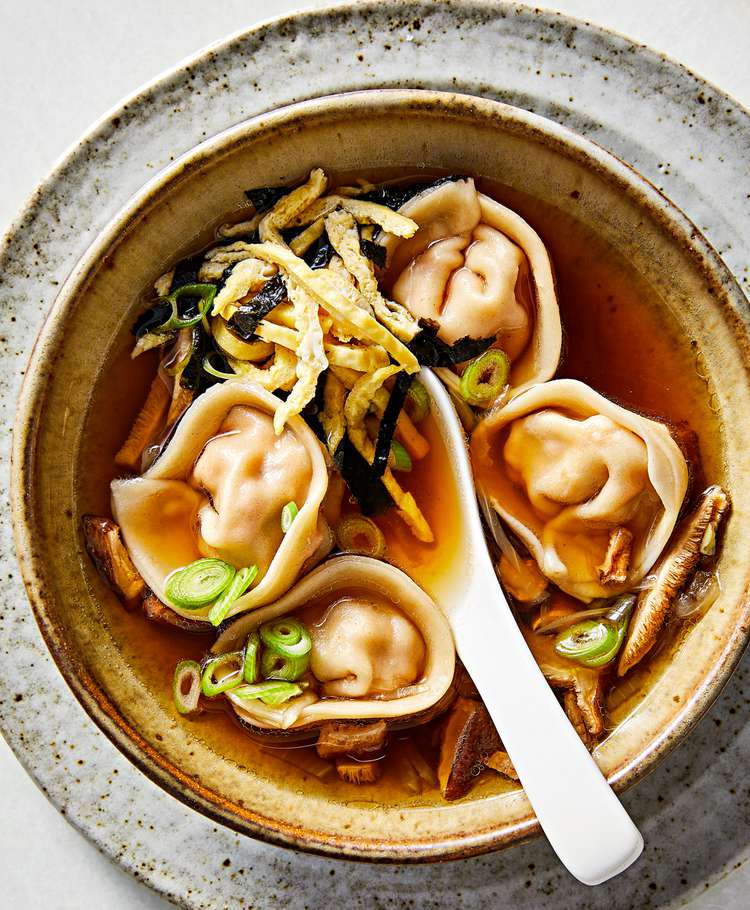Mandu-Guk (Korean Dumpling Soup)

Mandu-guk, or Korean dumpling soup, uses kitchen staples to create a delicious soup that you can add to your weekly dinner rotation. Shiitake mushrooms add a savory weight to your soup, plus some healthy anti-inflammatory properties, and pair well with nutty peanut oil. Ribbons of cooked eggs and nori make exciting garnishes as a final step. While this soup can be eaten alone or as a side dish, we recommend pairing it with our Korean Tofu and Kimchi Mandu for a nutritious and comforting meal. After all, you can't go wrong with adding simmering dumplings to this rich, shiitake-infused soup.
While our Korean Tofu and Kimchi Mandu is a vegan recipe, please note that mandu-guk has both fish sauce and eggs, making it vegetarian, not vegan. To make it vegan, substitute fish sauce for extra soy sauce or some shredded nori to get fish sauce's distinct umami flavor. As for the eggs, you can leave them out entirely or substitute them with some slices of cabbage to keep the varied texture and flavor palette of mandu-guk. No matter how you make it, you're guaranteed a warm and hearty dumpling soup that will fill you up on a chilly night.
Ingredients
-
1 oz. dried shiitake mushrooms
-
1 small onion, sliced
-
2 medium (4-1/8" long) green onions, white parts cut into 2-inch lengths and green parts thinly sliced for garnish
-
3 garlic cloves, smashed
-
2 Tbsp. soy sauce
-
1 Tbsp. toasted sesame oil
-
1 Tbsp. fish sauce
-
1 to 2 Tbsp. peanut oil or vegetable oil
-
2 eggs, slightly beaten
-
12-15 piece boiled Korean Tofu and Kimchi Mandu
-
1 sheet nori, cut into ¼- to ½-inch-thick strips
Directions
-
In a large pot bring 2 qt. water to boiling. Add dried shiitake mushrooms, onion, white parts of green onions, and garlic. Reduce heat. Simmer, uncovered, 30 minutes.
Test Kitchen Tip: You can use purchased broth for this recipe. Skip Step 1 and substitute 5 cups vegetable broth or mushroom broth.
-
Stir in soy sauce, sesame oil, and fish sauce. Season with salt if desired. Keep broth simmering.
-
Add enough of the oil to a large nonstick skillet to coat the bottom. Heat over medium-low.
-
When hot, add eggs to pan and spread evenly. Cook until eggs have begun to set, 1 to 2 minutes.
-
Fold eggs in half like an omelet; press down with a spatula.
-
Flip eggs; cook until done, 1 to 2 minutes. Carefully slide egg portion onto a cutting board and cut into very thin strips.
-
Add boiled Korean Tofu and Kimchi Mandu to the simmering broth; heat through.
-
Divide broth and mandu among bowls. Top with sliced eggs, nori, and thinly sliced green parts of onions.
Nutrition Facts (per serving)
| 431 | Calories |
| 27g | Fat |
| 28g | Carbs |
| 19g | Protein |
| Nutrition Facts | |
|---|---|
| Servings Per Recipe 4 | |
| Calories 431.3 | |
| % Daily Value * | |
| Total Fat 27.5g | 35% |
| Saturated Fat 6.8g | 34% |
| Cholesterol 133.8mg | 45% |
| Sodium 1433mg | 62% |
| Total Carbohydrate 28.1g | 10% |
| Dietary Fiber 2.2g | 8% |
| Total Sugars 2.2g | |
| Protein 19g | 38% |
| Vitamin D 0.8mcg | 4% |
| Vitamin C 5mg | 6% |
| Calcium 107.3mg | 8% |
| Iron 3.1mg | 17% |
| Potassium 469.9mg | 10% |
| Fatty acids, total trans 0.3g | |
| Vitamin D 31.9IU | |
| Alanine 1g | |
| Arginine 1.2g | |
| Ash 5.2g | |
| Aspartic acid 1.6g | |
| Caffeine 0mg | |
| Carotene, alpha 4.2mcg | |
| Choline, total 107.2mg | |
| Copper, Cu 0.5mg | |
| Cystine 0.3g | |
| Energy 1805kJ | |
| Fluoride, F 0.3mcg | |
| Folate, total 72.3mcg | |
| Glutamic acid 3.5g | |
| Glycine 0.8g | |
| Histidine 0.6g | |
| Isoleucine 0.8g | |
| Leucine 1.4g | |
| Lysine 1.2g | |
| Methionine 0.4g | |
| Magnesium, Mg 54.5mg | |
| Manganese, Mn 0.6mg | |
| Niacin 5.4mg | |
| Phosphorus, P 234mg | |
| Pantothenic acid 2.5mg | |
| Phenylalanine 0.8g | |
| Phytosterols 66.4mg | |
| Proline 1.1g | |
| Retinol 42.8mcg | |
| Selenium, Se 33.9mcg | |
| Serine 0.9g | |
| Theobromine 0mg | |
| Threonine 0.8g | |
| Vitamin E (alpha-tocopherol) 1.3mg | |
| Tryptophan 0.2g | |
| Tyrosine 0.6g | |
| Valine 1g | |
| Vitamin A, IU 343.3IU | |
| Vitamin A, RAE 52.7mcg | |
| Vitamin B-12 0.9mcg | |
| Vitamin B-6 0.4mg | |
| Vitamin K (phylloquinone) 31.7mcg | |
| Water 116.5g | |
| Zinc, Zn 3mg | |
*The % Daily Value (DV) tells you how much a nutrient in a food serving contributes to a daily diet. 2,000 calories a day is used for general nutrition advice.